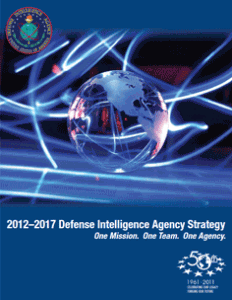Reference: Defense Intelligence Agency Strategic Plan 2007-2017 One Mission, One Team, One Agency
DoDPhi Beta Iota: New version. Platitudes without substance. Completely unfamiliar with what the ten high-level threats to humanity actually are, and completely inadequate with respect to actually producing strategic, operational, tactical, or technical intelligence. DIA's contribution to defense acquisition, whole of government harmonization for stabilization & reconstruction, and on and on and on is ZERO. Until DIA gets leadership with integrity, it will continue to be, as one author put it, “Still Broken,” or in the long-standing DIA motto: Kiss Up, Kick Down, Krap Always.
See Also (especially 37 reviews on DIA-related books and DVDs):
Reference: Intelligence Community Directive (ICD) Number 301: National Open Source Enterprise
Director of National Intelligence et al (IC)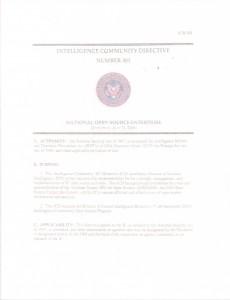
Phi Beta Iota Editorial Comment (DOI: 11 August 2009)
This well-intentioned document is the sole surviving legacy of the first ADDNI/OS who was destined to fail for multiple reasons, not least of which was the lack of seriousness with which all three DNI's have chosen to treat OSINT. As best we can tell OSINT is a side-show delegated by the DDNI/C to the National Intelligence Council, which lacks the gravitas as well as the knowledge to do anything constructive with an IC OSINT capability that exists in name only, the scattered kludge of activities not-with-standing (and less that of the U.S. Special Operations Command J-23, which is the only serious OSINT capability now operational in the USG).
We like this document. It is a good foundation for further deliberation. Right now it is best used to catalog what is NOT happening, for example:
POLICY 1b. Leverage burden sharing, partnerships, and outside capabilities.
POLICY 1c Organizations will share their information and capabilities to the fullest extent
The ADDNI/OS is in violation of this ICD as well as ICD 300 in delegating chairmanship of the National Open Source Council (NOSC) to the Director of the Open Source Council. That was ill-advised and that delegation should be immediately rescinded.
The NOSC portion of this ICD is useful, and inspires the logical follow-on need for similar capabilities for the US consumers of OSINT (state and local as well as private sector) who also have much to contribute but no place to send it; and for multinational consumers and producers of OSINT, both governmental and non-governmental.
The ICD calls for the NOSC to provide evaluations of the IC's open source gaps and capabilities. To our knowledge this has not happened, no doubt the result of a) virtually all of the NOSC members are not OSINT specialists, just bureaucrats handling OSINT as an additional duty; and b) they don't know what they don't know.
The ICD is flawed in allowing the OSC to report to a Deputy Director of the CIA. We strongly recommend that the Foreign Broadcast Information Service be reconstituted, that the CIA version of the OSC be disbanded, and that the Department of Defense be tasked with both creating a proper DNI OSC, and funding, on a non-reimbursable basis, the Open Source Agency recommended by the 9-11 Commission (pages 23 and 413) but under diplomatic auspices to better interact with all who have OSINT to contribute that do not wish to deal directly with an intelligence entity.
The ICD is flawed in allowing contractual obligations to prevent instant sharing of all OSINT acquired from outsourced means. This must be changed to demand immediate Modifications to all contracts so constrained, on penalty of losing all option years if not done. The ICD does not understand that contractors can keep original copyright but must be forced to provide the USG with an unlimited unrestricted license that includes public access to the information, as the National Institute of Health (NIH) is has been pioneering for over a decade.
The ICD tasks the IC element alone, not the consumers, with designating a primary open source coordinator, but fails to demand that this be a full-time job held by an OSINT specialists with competencies and qualifications such as need to be established by the DDNI/C and DDNI/M. Put bluntly, with the exception of CIA and DIA, none of the NOSC members are qualified for their role within the NOSC.
The DEFINITIONS that conclude this ICD can be improved upon. Virtually all of what is called OSINT today, except within the US Special Operations Command, is nothing more than Open Source Information. OSINT is tailored and actionable intelligence, not the New York Times or the daily OSC report. OSIF that is classified, as the OSC is prone to do, is neither OSIF nor OSINT.
2006 Forbes Blank Slate On Education
Articles & Chapters, Education (General), Education (Universities), Information Society, Intelligence (Public)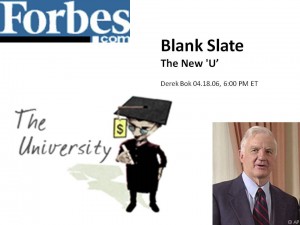
Although I had long recognized that intelligence at the national level is remedial education for policy-makers and their staff who live in a “closed circle,” it was the juxtaposition of Derek Bok's review of education with my own on intelligence in the same issue that made me realize we need a Deputy Vice President for Education, Intelligence, and Research. I tried to get Colin Powell interested in the idea, to no avail. In my view, we will always need spies and secrets, but they must be cast in the context of a Smart Nation, and our secret intelligence budget is so large now that it can safely afford to become a modest bill-payer for advances in education and research that are part of the Smart Nation triad.
It is not for me to do anything other than champion the idea–others actually manage the money and it is they who decide how the taxpayer dollar is spent.
2006 Information Operations (IO) Back into DIME
Information Operations, Information Society, Information Technology, Monographs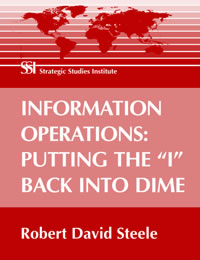
DIME is military for Diplomatic, Information, Military, Economic. It is an old acronym that leaves out Social, Cultural, Technical, Demographic, Natural, and Geographic as well as Political and Criminal, but we work with what we have.
The Strategic Studies Institute (SSI) at the Army War College in Carlisle, PA is one of America's gems, along with other service educational and strategic thinking centers. The professionalism and open-mindedness and rock-solid integrity are models to be emulated by all others.
Reference: National Open Source Enterprise
Director of National Intelligence et al (IC)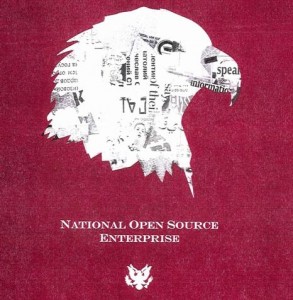
The National Open Source Enterprise (NOSC) of April 2006 is all that is left of the Jardines Fiasco. Here are our comments.
1. Illustration is wrong. OSINT is both its own discipline and the FOUNDATION for all of the other disciplines. It is especially valuable as a gap filler and in taking care of all the consumers that do not get classified decision support. That needs to be central message.
2. Imperative for Open Source fails to cite the Aspin-Brown Commission that found IC to be “severely deficient” and recommended that OSINT be a “top priority” for both DCI attention and for funding. It also fails to cite the 9-11 Commission Report, pages 23 and 413, calling for a separate Open Source Agency co-equal to and independent form the CIA.
3. The five goals are good ones. The DNI Open Source Center is inflated in Goal Two and should be removed. In Goal 3 there has been no inventory of open source capability and this needs to be a priority, recommend DIOSPO point this out and volunteer to take on the task. OSC cannot be trusted with this task for multiple reasons.
4. Requirements system must be BOTH part of the all-source system and also available at the unclassified level to all consumers including foreign governments and non-governmental organizations. Requirements entered at the high side that can be cleared for the low side should go there, and all requirements at the low side should be mirrored to the high side. Ben has it right at SOCOM—using COLUSEUM not only got the analysts used to putting in OSINT requirements, but it gave Ben the satisfaction metrics he needed to prove 40% of ALL SOF GWOT EII are being answered by OSINT.
5. No progress appears to have been made on harvesting state and local information, that probably needs its own committee, consider bringing in a National Guard Colonel on reserve duty, ideally with a law enforcement badge in real life, to run that NOSC sub-committee.
6. Ditto on international partnerships. The UN would be the perfect partner for DIA, via the Situation Centre.
7. Goal Four: OSC is in violation of the broadest possible dissemination. Anything that is classified should not be allowed to count toward OSINT production.
8. Goal Five: Stupid to use a Lockheed sales mark (SkunkWorks®). Change to Innovation Center. Goal 5.2 needs to be beefed up. EarthGame™ as designed by Medard Gabel, #2 to Buckminster Fuller, is perfectly suited to meeting and furthering goals 5.3 and 5.4. The UN State of the Future project and Millenium Goals can be tied into this.
2006 Robert Steele: Reinventing Intelligence
MemorandaREINVENTING INTELLIGENCE
Robert David Steele
America is spending $70 billion a year on what it calls “Intelligence,” and for that amount of money we are successfully stealing 5% and ignoring 95% of the information relevant to our national security and prosperity. We are long over-due for a reinvention of national intelligence.
Without belaboring the point, we would observe that secret intelligence has proven both ignorant, and ignorable. Technology is not a substitute for thinking, satellites are not a substitute for foreign language and area skills. Collection without sense-making, both automated and human, is both wasteful and falsely reassuring.
Analysis by loyal citizens who were hired not for their depth of knowledge but because they could be “cleared” by security officers with a high school education (i.e. the candidates did not spend a lot of time overseas and are “easy” to validate)—and particularly analysis limited to secrets in isolation from historical or cultural context such as can only be found in open sources of information in foreign languages—is pathologically misleading. It should come as no surprise, then, to find that our national intelligence community is not only ignorant of reality, but easily ignorable by policymakers as well. Only public intelligence briefings can inoculate public policy against false politically-motivated claims that suggest secret intelligence validation when in fact no such validation exists.
This also imposes extraordinary additional costs on the individual tax-payer. Inadequate intelligence is at the root of three great drains on the U.S. Treasury: 1) it fails to blow the whistle on defense waste, where 90% of the acquisition dollars are spent on high-end systems relevant only to state-on-state warfare, which is 10% of the actual threat; 2) it fails to make the case for peaceful preventive measures or investments, including agricultural, cultural, diplomatic, educational, and information-sharing investments; and 3) it fails to identify and help collect the $600 billion a year in tax avoidance, corruptly-mandated subsidies, and illicit trade not subject to taxation—funds that could finance a reduction of the national debt, critical social programs cut to finance the war on Iraq and a bloated defense bureaucracy, and most especially—a completely new and modern approach to national education at all levels, embracing both life-long education and distance learning as well as new programs that combine social and economic internships with school learning.
As we enter the fifth year of a global war on terror, much of it of our own making from decades of virtual colonialism and predatory immoral capitalism, it is essential to point out that the end of cheap oil, the end of free clean water, the rise of pandemic disease, the proliferation of a cheating culture in America concurrent with uncontrolled illegal immigration, the reduction of scholarship and the increase of obesity, all, in combination, do not bode well for the Republic, nor for its allies. Absent the re-emergence of engaged informed citizens, the Republic is at risk of dissolution. Two complicatory revolutions have taken place in the past five years, and neither the policymakers nor the public have acknowledged them.
First, the Internet and hand-held devices have enabled all individuals to learn as much as they wish to from open sources in all languages. The publics of the world are no longer ignorant of global realities. This means that the five billion people at the Bottom of the Pyramid (BoP) are now the world’s one remaining super-power. We can empower them with wealth—we cannot kill them all before they overwhelm us directly or consume the finite resources of the Earth indirectly.
Second, the rise of suicidal terrorism, popularized by Iran and its off-spring Hamas and Hezbollah, who also pioneered Improvised Explosive Devices (IED), has established a new balance of power. It is America that is on the run, from the “death of a thousand cuts” that can be applied with impunity to oil, water, and electricity connection points in Nigeria, Saudi Arabia, and Venezuela. Al Qaeda will win this war by raising the price of oil to $300 a barrel, and there isn’t a thing we can do about it with our present penchant for governance by ideological fantasy.
All of our money is invested in the four secret “pillars,” or collection stovepipes, and virtually no money—quite seriously—no money of significance, is invested in either the open source intelligence foundation of this intelligence temple, nor in sense-making and mature analysts. We continue to hire young people rather than world-class experts, in part because world-class experts have complicated backgrounds and our security officers are unable to cope. We lack knowledge of history, culture, and all manner of foreign languages and local area understanding.
In today’s world it is not possible to win against asymmetric opponents unless you play by new rules. The “old school”—government bureaucrats accustomed to unlimited budgets and secret methods not subject to accountability for failure, would try to bribe a player (HUMINT), put a “bug” in the dug-out (SIGINT), “sniff” the direction and speed of the ball (MASINT), or take a satellite picture of the field every three days (IMINT). The new craft of intelligence tells everyone they are part of the team, and if they catch the ball it is an out. OSINT harnesses what everyone sees and knows. It changes the rules of the game.
We must reinvent intelligence. Fortunately, this is happening outside of the government. Collective Intelligence, also known as “Smart Mobs” or “The Wisdom of the Crowds,” is ascendant. This New Craft of Intelligence recognizes that history matters, that cultural and biological diversity matter, that sharing information rather than stealing secrets is the primordial principle, and that sustaining the Earth is so complex as to demand a World Brain—a coming together of all men and women of good will to re-establish Communitas, eliminate war and waste and the contrived concept of scarcity, while creating sustainable stabilizing indigenous wealth everywhere.
Information can be used to deter and resolve conflict, and to create wealth. This is not, however, primarily the provenance of governments. Governments can serve as the catalysts and benefactors for what I call the Open Source Information System – External (OSIS-X), but governments are primarily the beneficiaries of contributions from what I have named the seven tribes of intelligence, each with its own unique direct and tacit knowledge to share: government, military, law enforcement, business, academic, ground truth (non-governmental and media), and civil (citizens, labor unions, religions). We need information-sharing agreements among these tribes.
As we enter the Age of Intelligence, we must realize that Weberian bureaucracy is now dead. The old justification for bureaucracy, to pigeon-hole knowledge, is not just passé, it is pathologically passé. We have built Iron Curtains between nations, Bamboo Curtains between Industries and Organizations, and accept Plastic Curtains between Individuals. The Internet has changed that. It is now possible to share knowledge securely and with both financial and moral integrity, across all boundaries. It is now possible to achieve what the Swedes call Multinational, Multiagency, Multidisciplinary, Multidomain Information-Sharing (M4IS), and it is this concept, along with Collective Intelligence, that assures us of a Revolution in Intelligence Affairs in the near term future, of a bottom-up revolution.
“A Nation’s best defense is an educated citizenry.” Thomas Jefferson said that. Not only was he right when he said it, but today, at the dawn of the Age of Intelligence, his words must lead us to realize that today U.S. “intelligence” is upside-down and inside- out. It is upside-down because it relies on satellites in outer space rather than human eyes on the ground; and it is inside-out because it tries to divine intelligence unilaterally, without first asking the seven tribes of our coalition partners what they might provide. We must have access to all information, in all languages, all the time: Information Operations (IO) must now integrate but subordinate secret intelligence within a larger frame of public reference.
The only hijacked airplane that failed to hit its target on 9/11 was the one where citizens, armed with open source information, took direct action. This is the model for our future, for the threats that face us, as well as the opportunities, do not lend themselves to pre-planned centrally-controlled government direction. Only a Smart Nation, a nation in which each person is both a collector and consumer of intelligence, able to share information intelligently and in real time, will survive the tribulations to come.
Reinventing intelligence requires that we invest heavily in understanding the history of all peoples; that we acknowledge the current perspectives of all faiths and tribes; and that we plan for a future of what Stewart Brand calls “The Long Now,” with intelligence supporting the principles of longevity, maintainability, transparency, evolvability, and scalability.
We may not be interested in reality just yet, but reality is most assuredly interested in us St.
ACRONYMS
CIA Central Intelligence Agency, combination of HUMINT and all-source analysts
DO Directorate of Operations, today the National Clandestine Service
FBIS Foreign Broadcast Information Service, within CIA, modest open source monitoring
HUMINT Human Intelligence, generally clandestine or covert
IED Improvised Explosive Devices
IO Information Operations
IMINT Imagery Intelligence, relying exclusively on expensive secret satellites
M4IS Multinational, Multiagency, Multidisciplinary, Multidomain Information Sharing
MASINT Measurements & Signatures Intelligence, very esoteric
NGO Non-Governmental Organizations, custodians of 80% of what we need to know
NRO National Reconnaissance Office, builder of the satellites
NSA National Security Agency, responsible for secret eavesdropping of voice and data signals
OPG VPN Operational Planning Group Virtual Private Network
OSINT Open Source Intelligence, using only legally and ethically accessible information
OSS Office of Strategic Services (WWII), Open Source Solutions (modern)
SIGINT Signals Intelligence, relying heavily on expensive secret satellites and ground stations
UN United Nations, reliant heavily on direct observation and OSINT
REFERENCES
http://www.oss.net/BASIC Open Source Intelligence Familiarization Documents (Page of Hot Links)
http://www.oss.net/MIOC Concept for a Multinational Information Operations Center (MIOC)
http://www.oss.net/IO Briefing on Modern Information Operations IO) and the Available Book
http://www.oss.net OSINT in 30,000 pages from 1992 to date.
ABOUT THE AUTHOR
Robert David Steele Vivas is today the CEO of OSS.Net, Inc., a veteran-owned small business incorporated in the Commonwealth of Virginia. Since 1988 he has focused on the need to reinvent intelligence by first establishing the separate discipline of Open Source Intelligence (OSINT), and then by focusing on sense-making through a new craft of intelligence that fully integrates history, culture, and all that can be known or intuited by the “seven tribes.” Born in New York, he spent 20 years overseas as the son of an oilman, half in Latin America, half in Asia including four years in Viet-Nam. He completed his undergraduate education at Muhlenberg College, specializing in political science, with a thesis on home-host country issues with multinational corporations. His first graduate degree is from Lehigh University, specializing in international affairs, with a mini-thesis on the origin and purpose of the state, and a graduate thesis on predicting and analyzing revolution. Steele joined the United States Marine Corps in 1974, serving on active duty as an infantry officer including a Marine Expeditionary Force deployment (32 ships) during which he served as S-1/Adjutant for a 1,500 man Battalion Landing Team. Joining the Central Intelligence Agency (CIA) in 1979, he went through accelerated training and served three back-to-back tours in Latin America as a clandestine case officer, including one tour as one of the first officers focused full-time on terrorism. He returned to serve three Headquarters tours in counterintelligence, advanced information technology and advanced technical (satellite) program evaluation. While in the CIA, he completed a second graduate degree with the Extension Program of the University of Oklahoma, specializing in public administration, with a thesis on strategic and tactical information management issues for national security. He also completed the Naval War College non-residence program, earning a diploma with distinction. Having remained a Reserve officer with twice annual active duties as a Tactical Exploitation of National Capabilities (TENCAP) specialist, he helped draft the Marine Corps Intelligence Plan (MCMIP). Invited to resign from the CIA, he became the founding Special Assistant and concurrently the Deputy Director of the Marine Corps Intelligence Command (then Center). He wrote the first official appeal for a national OSINT program in 1988, and spent four years trying to heal national intelligence from the inside, finally resigning on 1 April 1992 to campaign independently. He is the author of three books, ON INTELLIGENCE: Spies and Secrecy in an Open World; THE NEW CRAFT OF INTELLIGENCE: Personal, Public, & Political; and INFORMATION OPERATIONS: All Information, All Languages, All the Time. He is also a contributing editor of PEACEKEEPING INTELLIGENCE: Emerging Concepts for the Future. His next book will define the remainder of his life and is tentatively entitled INFORMATION PEACEKEEPING: Empowering the Poor to Save the World. Recognition includes minor CIA, Department of State, and Department of Defense awards, and Pi Alpha Alpha (honor society for public administration). He has been twice-named to the Microtimes 100 (industry leaders and unsung heroes creating the future), and was featured in Year in Computers 2000. Alvin Toffler calls him “the rival store” in War and Anti-War, where OSINT is depicted as the foundation for the future of intelligence. He is an elected member of the Silicon Valley Hackers Conference, and speaks to the Hackers on Planet Earth and 2600 Society in New York every two years. As a hobby, he reads, and is the #1 Amazon reviewer for non-fiction books about national security and global issues. He is married to Kathy Lynette Steele nee Jones, a CIA veteran from West Virginia. They have three children—a techno-artist, a reader, and a wide receiver—and re-affirmed their marriage in 2006.

